|
|
|
Sort Order |
|
|
|
Items / Page
|
|
|
|
|
|
|
| Srl | Item |
| 1 |
ID:
134209
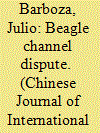

|
|
|
|
|
| Publication |
2014.
|
| Summary/Abstract |
The Beagle Channel dispute between Chile and Argentina presented great challenges to them. An award delivered by an arbitral tribunal did not manage to settle it. The crisis after the award brought the States to the brink of war. Only tenacious efforts by the Holy See to mediate between these two largely Catholic nations managed to calm tensions as well as a change in political climate allow the parties to finally settle the dispute. This paper describes and analyses the background to the dispute, the principles and arguments involved in the dispute, the decision of the Court of Arbitration, the crisis following the award, the papal mediation and the events that finally brought the dispute to an end. Some general comments will be offered in the last section.
|
|
|
|
|
|
|
|
|
|
|
|
|
|
|
|
| 2 |
ID:
134211
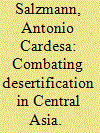

|
|
|
|
|
| Publication |
2014.
|
| Summary/Abstract |
This article appraises the Central Asian Countries' Initiative on Land Management (CACILM) as an innovative experience of regional co-operation to implement the Convention on Desertification. Despite high initial expectations, the actual implementation process has suffered drawbacks. The Central Asian countries' commitment and capacity to sustain this process depends heavily on international support. Moreover, the process's low political profile and the weak capacities of the Central Asian authorities to engage in meaningful transnational co-operation are significant hurdles to be tackled. At the same time, national and regional efforts to combat soil degradation and desertification have not yet been properly mainstreamed with other more consolidated processes for the sustainable management of natural resources, such as the IFAS. It is argued that this may be a possible solution for the future of CACILM.
|
|
|
|
|
|
|
|
|
|
|
|
|
|
|
|
| 3 |
ID:
134207
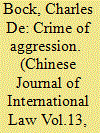

|
|
|
|
|
| Publication |
2014.
|
| Summary/Abstract |
With the end of the Cold War, military interventions in the name of an "expanded" interpretation of self-defense or in the name of humanitarian intervention have taken front stage. Hence the deep Third World support for the resurgence of the individual crime of aggression, through which they want to replace the concept of aggression front and centre before the international community. To counter any political use of the notion of aggression, Third World States want clear and unalterable definitions of both the crime of aggression and of State aggression, with this latter being an element of the former. In this article, after having shed light on the Third World's role in the long road to defining the individual crime of aggression and the State aggression underlying it, we will thus evaluate this effort. We will attempt to show that there is a strong possibility that any push towards criminalizing aggression at the level of the individual will not accomplish the desired goal. It could also severely backlash against the Third World States. We think there is a real risk that the accused standing before international criminal tribunals will be prejudiced by the power play that pervades international politics, however rigid the definition of the crime.
|
|
|
|
|
|
|
|
|
|
|
|
|
|
|
|
| 4 |
ID:
134210
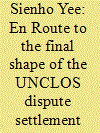

|
|
|
|
|
| Publication |
2014.
|
| Summary/Abstract |
This paper highlights several pivotal negotiating procedural steps that ultimately helped to promote the emergence of the final shape of the UNCLOS dispute settlement system. These steps include, for want of better phrasing, the following: (1) the package deal decision; (2) the consensus approach; (3) building consensus by privileging the best second choice; (4) building consensus by privileging the existing negotiating text through the rule of silence; and (5) failing consensus in the Negotiating Group, the Chairman presenting his own proposals as suggestions to the plenary. Needless to say, these steps are worthy of consideration by future treaty-makers and leaders in treaty-making when they are faced with complicated negotiating tasks, even if not as difficult as those during the monumental UNCLOS III.
|
|
|
|
|
|
|
|
|
|
|
|
|
|
|
|
| 5 |
ID:
134205
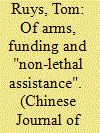

|
|
|
|
|
| Publication |
2014.
|
| Summary/Abstract |
In spite of legal objections, the European Union (EU) in May 2013 gave the conditional green light for the transfer of arms to the Syrian Opposition Council. The EU's decision is not a solitary move. Several other States, including Russia, the United States, Qatar and Saudi Arabia, have provided arms, funding and/or "non-lethal assistance" either to the Syrian government or to rebel forces combatting the Assad regime. The present contribution aims to shed light on the legality of such assistance. On the one hand, it assesses legal objections related to the fact that third-State assistance is used for the commission of widespread war crimes and human rights violations. On the other hand, it examines the compatibility of such assistance with the non-intervention principle and, in so doing, examines to what extent the latter principle discriminates between de jure governments and non-State armed groups in the context of a civil war.
|
|
|
|
|
|
|
|
|
|
|
|
|
|
|
|
| 6 |
ID:
134206
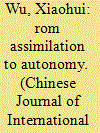

|
|
|
|
|
| Publication |
2014.
|
| Summary/Abstract |
This article examines regional autonomy in China's ethnic minority areas and its implications for minority rights in China. It argues that China's regional autonomy regime is in need of improvement in quest for national unity, social harmony and equality among ethnic groups in China. In light of past State-minority relations, as well as changing conditions in China, and by reference to international experience, the article offers suggestions for China to improve and implement minority rights legislation and policies. It argues that, under the existing political system in view of the existing basic framework on minorities, the Chinese State should adopt a new approach which encompasses elements of rule of law, deliberative democracy and international human rights standards. The new approach should guarantee respect for minority identities and seek means of establishing their respective autonomies and realizing their special rights. It should focus as much on the process as on the decisions, on the voices as on the results and on the individuals as on the groups. In this way, China's national regional autonomy would be oriented towards a complete policy of commitment to pluralistic values within the Chinese polity and would be more likely to satisfy the minority aspirations and the State's need for national stability and unity.
|
|
|
|
|
|
|
|
|
|
|
|
|
|
|
|
| 7 |
ID:
134208


|
|
|
|
|
| Publication |
2014.
|
| Summary/Abstract |
The end of the Cold War should also have meant the coming of the flourishing of international law, many (myself included) naively believed. However, the "uni-polar moment" that gained momentum in the 1990s, though its life-span turned out to be rather short, saw a gung ho attitude towards foundational principles of international law such as non-use of force and non-interference in internal affairs of states. NATO's 1999 operation over Kosovo, the 2003 invasion of Iraq, the 2008 Georgia-Russia war, policies reflected in the slogan "all the options are on the table", and now Ukraine's tragedy show that international law and morality are used mainly as covers in the geopolitical struggle. If the Cold War manifested the competition between two ideologies-capitalism and communism-today's main historical controversy is between the uni-polar and multi-polar visions of the world. It is not ideological, it is geopolitical, where ideology, morality and law are used as tools and collaterals in the struggle for the configuration of tomorrow's world. It is also a struggle for the nature of international law. Will it become a kind of supra-national law (à la EU law for the whole world) dictated from one centre, or will it develop as a legal system based on the balance of interests and values of different states and cultures? The author believes that the world is simply too big, complex and diverse for the first choice to realize in practice. Its rich tapestry cannot be flattened into a carpet where one pattern, be it of a Judeo-Christian, Anglo-Saxon, Confucian, Muslim or even secular liberal-democratic pattern, prevails. Attempts to force one, "the only true", vision on the whole world not only undermine international law; they are also utopian endeavours fraught with endless conflicts.
|
|
|
|
|
|
|
|
|
|
|
|
|
|
|
|
|
|
|
|
|